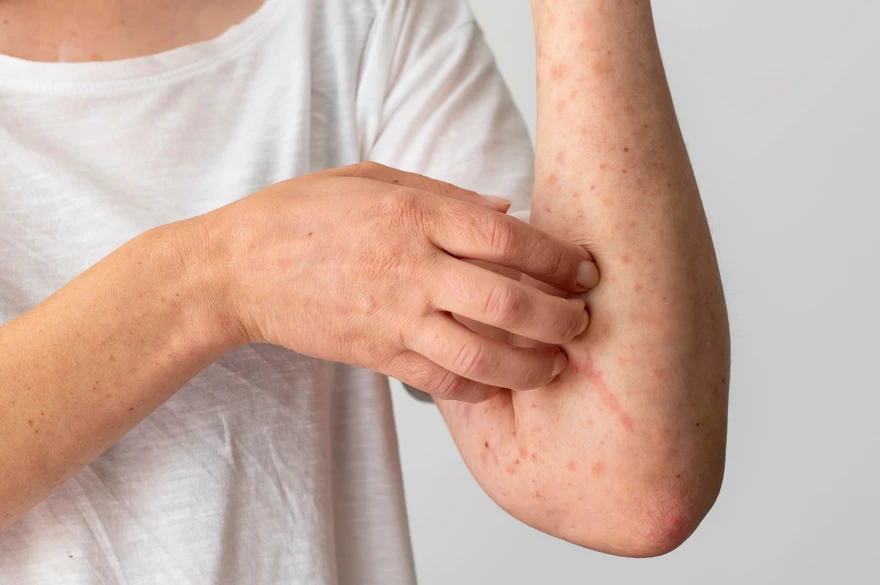EGFR Mutation Detection Test (EXONS 18, 19, 20, 21) in Kalyan
50+ booked in last 3 daysEGFR Mutation Test Overview
EFGR mutations are most commonly seen in Non-Small Cell Lung Cancer (NSCLC) adenocarcinomas. EFGR mutations tend to occur in women with little or no smoking history. The doctor may recommend testing if they suspect one has lung cancer. A biopsy is recommended if a person is already diagnosed with lung cancer, or if there is a recurrence of tumours in the patient.
Up to 20% of NSCLC tumors harbour the EGFR mutation in Exons 18-21, and that ~85% of patients with these patients respond to TKI treatment.
It’s pertinent that anyone with a diagnosis of lung cancer or those who are suspected of the disease should ask their doctor whether to get tested for EFGR. The doctor can use the same biopsy tissue used to diagnose lung cancer for testing for mutations.
Exons and introns are nucleic acid sequences made up of the polynucleotide chain. However, the structure of introns is more complex with high GC-rich regions and repetitive sequences. Both the exons and introns take part in protein formation and follow the DNA packaging mechanism to fit inside a cell.
Written by: Dr Vishal Wadhwa, M.D, D.N.B Microbiology, Medical Affairs
EGFR Mutation Detection Test (EXONS 18, 19, 20, 21) Price in Kalyan
Metropolis Healthcare is a leading diagnostics centre and pathology lab in India equipped with the latest state-of-the-art technologies that provides the EGFR Mutation Detection Test (EXONS 18, 19, 20, 21) with a clear pricing structure
The price of EGFR Mutation Detection Test (EXONS 18, 19, 20, 21) in Kalyan is ₹ 8,000
We are committed to deliver accurate and quality results from the best labs in India with complete transparency regarding test cost and turnaround time. No matter where you are, we strive to offer patients high-quality service that is affordable and accessible.
Frequently Asked Questions
A positive result is an indicator of the presence of EGFR mutations and TKI therapy can be effective on this person with non-small lung cancer.
However, a negative result does not necessarily mean that there is the absence of EGFR mutation. The particular patient may still harbor an EGFR mutation. The patient with a negative result with this test should be considered for mutation testing of a tissue specimen for EGFR mutations. The limit of detection of this assay for the detection of EGFR mutations is affected by the amount of cell-free DNA in the blood.
Your healthcare provider may ask you to take this test if you have been diagnosed with non-small lung cancer and tyrosine kinase inhibitors (TKIs) are being considered for the treatment. It has been demonstrated in several studies that EGFR gene mutations act as an important marker to effectively select patients for the treatment with TKIs. That said, the effectiveness of EGFR-targeted therapy in non-small cell lung cancer patients is restricted to patients whose tumors possess mutations in the EGFR gene.
Lung cancers are one of the leading causes of death in developed countries. Unfortunately, 60% of non-small lung cancers are high-stage or advanced tumors by the time they are detected. The majority of them already get metastasized and become inoperable tumors before diagnosis.
On the other hand, approximately 25% of non-small cell lung cancers have mutations in the EGFR gene and most mutations exist in hotspot regions in exons 18, 19, 20, and 21 of this gene. Therefore, the discovery of mutations in the EGFR gene that have the potential to make the tumor sensitive to tyrosine kinase inhibitors (TKIs) treatment has become one of the most crucial breakthroughs in the field of oncology in the past decade.
Various researches have shown that the response rate to the TKIs such as Erlotinib or Gefitinib as first-line treatment in patients with EGFR mutated non-small lung tumors is far superior in comparison to the conventionally used chemotherapy. Hence, these two drugs have been approved by the FDA for use in the treatment of patients with non-small lung cancer who previously did not respond well to chemotherapy.
Ratings & Reviews (0)
Why Metropolis?
Metropolis has a team of 200 senior pathologists and over 2000 technicians delivering diagnostic solutions in the areas of routine, semi specialty and super specialty domains like Oncology, Neurology, Gynaecology, Nephrology and many more.
We offer a comprehensive range of 4000+ clinical laboratory tests and profiles, which are used for prediction, early detection, diagnostic screening, confirmation and/or monitoring of the disease.



.png)















 WhatsApp
WhatsApp